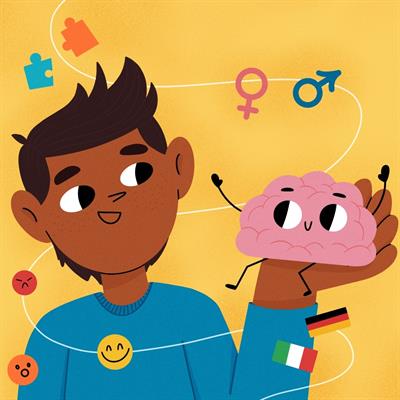
Who are you?
Collection Editors
Axel Cleeremans, Changiz Mohiyeddini, Livio Provenzi, Sara PalermoViews
480,472 viewsParticipating Sections
Submission Deadline
Closed
Articles

Neuroscience and Psychology
14/02/2025
“Plastic” Connections Between Neurons Help Us...
Authors
Chiara Di Fazio, Elena Protopapa, Sara Palermo
Neuroscience and Psychology
03/01/2025
Parental “Superpowers”: How Caregiving Can Shape...
Authors
Livio Provenzi, Camilla De Santis, Elena Capelli
Neuroscience and Psychology
22/11/2024
Do Primates Make Friends Like Humans?
Authors
Anna Ilona Roberts
Neuroscience and Psychology
18/09/2024
What is Consciousness and What is it Good For?
Authors
Inès Mentec, Léa Moncoucy, Yanis Mouheb, Axel Cleeremans
Neuroscience and Psychology
23/07/2024
Resilience—The Ability to Bounce Back!
Authors
Jordan Ensz, Melanie Ermler, Huda Rabbani, Madison Saunders...
Neuroscience and Psychology
09/01/2024
Wait! How We Control Our Thoughts and Actions as...
Authors
Coline Grégoire, Steve Majerus
Neuroscience and Psychology
22/11/2023
What Is Alzheimer’s Disease?
Authors
Sophie Hoyer, Stephanie Baker, Changiz Mohiyeddini
Neuroscience and Psychology
30/10/2023
Brain Chemicals That Make Us Happy Or Sad
Authors
Amy Kim, Panisara Sutthipong, Mya LeVaughn, Nico Osier
Neuroscience and Psychology
23/10/2023
What is Culture?
Authors
Akshata R. Naik, Stephanie Baker, Changiz Mohiyeddini
Neuroscience and Psychology
29/08/2023
How Do We Learn and Why Do We Use Abstract...
Authors
Anna M. Borghi, Ilenia Falcinelli, Chiara Fini, Angelo...
Neuroscience and Psychology
25/07/2023
What Is an Emotion?
Authors
Changiz Mohiyeddini, Stephanie BakerAbout this collection
Psychology and the neurosciences attempt to understand who we are, what makes us us. At its core, this involves explaining how the biological activity of the brain produces mind — our mental states and everything that we feel. But we also need to address questions such as how our mind develops, how we interact with other people, how we perceive the world around us, how we make decisions — in short, how does our mind work?The core goal of this collection is to offer a set of articles highlighting some of the central concepts and empirical findings in the broad domains of psychology and human neuroscience. Many of these findings are surprising in different ways and hence of inherent interest to the wider public, and in particular to an audience of kids who are at an age where one tries to understand oneself.
The collection will involve contributions from different Frontiers in Psychology SCEs and will include a variety of approaches and of domains, such as:
• Perception: Core findings, but also biases, illusions and other surprising phenomena
• Consciousness: How come we are aware of ourselves? What can we do unconsciously?
• Emotion: What role do they play in decision-making? How can we control them?
• Language: How come we learn to speak without instruction? Is it good to be bilingual?
• Gender: How do our sexual preferences and identity develop?
• Development: What changes as we grow up? Can kids sometimes be better than adults?
• Memory: How is our memory organized? How do we make it better?
• The brain: How does the brain work? What can go wrong?
• Culture: Do people in different cultures see the world differently?
Manuscripts will preferentially include experimental findings put in the context of core theoretical constructs.
Would you like to submit to this collection?
For researchers interested in submitting to this Collection, please consult our author guidelines and check that you have all the essentials included before submitting
Editorial Board
Collection Editors
Science Mentors

Jenna Adams

Analía Arévalo

Meredith Clifford

Morgan Coburn

Christina Driver

Lucette Gargett

Zheng JIN

Nathan Jorgensen

Jacqueline Lai

Leticia Leon

Susana Martinez-Conde

J. Patrick Mayo

Maria Concetta Miniaci

FERNANDO OCHOA-CORTES

Sok King Ong

Rahul Patel

Mohammad Qneibi

Katherine R. Yao

Vinitha Rangarajan

Sucharita Saha

Abhishek Singh



